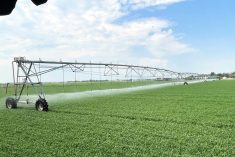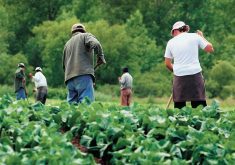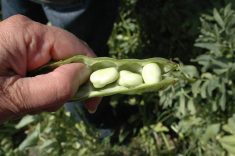Dean Gallimore breathed a big sigh of relief when he learned that the federal government had scrapped its plans to eliminate the cash ticket deferral system.
“This is a relief in a big way,” said the chartered accountant. “I was very concerned that they were going to scrap the system. Farmers could deal with that, but it would just be another level of complication that they would have to deal with.”
- Read more: Cash ticket deferral option to remain unchanged
Read Also

‘Millions will die’: Foodgrains Bank faces $2.7B federal funding threat
Foodgrains Bank warns $2.7B aid cut triggers a humanitarian crisis, risking global hunger relief and 40 per cent of its funding.
Deferred cash tickets help smooth the ups and downs in annual farm income, such as when much of a bumper crop is sold in the year it was grown or when a price spike prompts producers to empty their bins. Deferring some of those sales allows a portion of that money to be taxed in the following year.
“The nature of farming is a bit of boom and bust. Commodity prices can be good, or they can be bad,” said Gallimore.
“What this allowed farmers to do was manage their income. It’s a planning tool to allow them to run their businesses and continue to produce food for all of us.”
The federal government had removed the cash ticket deferral system as part of the 2017 budget, but quietly backpedalled earlier this month as part of a larger announcement of “additional tax support for Canadian farmers.”
“We’re pleased to see the reversal on that decision,” said D’Arcy Hilgartner, chair of Alberta Pulse Growers.
“Deferred cash tickets have always been a useful tool for farmers to help them change how their income was applied.”
But Gallimore isn’t holding his breath that more tax relief is coming for producers — particularly when it comes to the proposed changes to the federal Income Tax Act.
“I’m not sure if we’re going to see much more changes,” he said. “They’ve already reversed a bunch of things — thank the lord, because there were some pretty ugly ones in there — but I am concerned that they’re probably going to proceed with what they’ve got.”
These changes — which Gallimore calls “some of the most onerous changes that I’ve seen in 30 years of my practice” — included regulations around lifetime capital gains deductions, income splitting, and incorporating farms, among other things, when it was announced in mid-July.
Ottawa has cancelled proposed changes to capital gains exemptions — one of the most controversial components of the tax changes for farmers, Gallimore said at the Alberta Crops Breakfast earlier this month.
“It was just a nightmare. Thank god they’ve announced that they’re backing away from that.”
Under the original tax proposals, using a child’s capital gains deductions would come with various restrictions. Children under the age of 18 who receive a capital gain would not be able to use their deduction on any property, and capital gains allocated from a family trust would no longer be eligible for a deduction.
Children would also not be able to use their capital gains deductions on the appreciated value of eligible farm property that built up before their 18th birthday. And a ‘reasonableness test’ would be applied to capital gains that were realized through farm partnership interests or shares.
“A lot of people were panicking, thinking they were going to have to transfer their land to their child before the end of December,” said Gallimore.
“The good news is the panic is off the table — they’re not going ahead with it.”
The original proposal also included an ‘anti-avoidance’ provision that would prevent converting dividends to another form of income at a lower tax rate, which was broad enough to include things such as selling farm assets to a corporation.
“There was a big concern that that was no longer going to be allowed, but thank god that’s off the table.”
Tax uncertainty
The federal government has also “backed off a little bit” on its proposed plan to tax investment income at a high rate, said Gallimore. Initially, the tax rate on investment income could have been as high as 70 per cent, but that plan has been adjusted.
“What they’ve said is that they’re going to allow you to have up to $50,000 of investment income taxed under the old rules — at 50 per cent, not 70 per cent. So every year, you can have some investment income,” he said.
“They’ve also said that existing investments will not be caught by this rule. For those of you who are retired or semi-retired and have a bunch of money invested inside your corporation, they’ve said you’re OK.
“That’s a bit of relief. We’ll have to stay tuned to see where that goes.”
But right now, the proposed tax regulations are still up in the air, and that’s making it hard for producers and accountants alike to prepare for the changes.
“We don’t yet have the complete legislation to look at the details and know for sure what they’re doing,” said Gallimore.
Hilgartner agrees.
“A lot of these things are just ‘what-ifs,’” said Hilgartner, who farms near Camrose.
“Until we actually see some draft legislation, it’s difficult to assess what the actual risks are. There have been a lot of ideas put out there, and then brought back, so the unknowns become a bit of a challenge.
“We have to do the best we can with the information that’s available.”
That’s why it’s critical for producers to sit down with their advisers and get a handle on their financial planning sooner rather than later.
“Every circumstance is different,” said Gallimore.
“I can’t emphasize enough that you need to get some advice from someone who understands these rules.”















